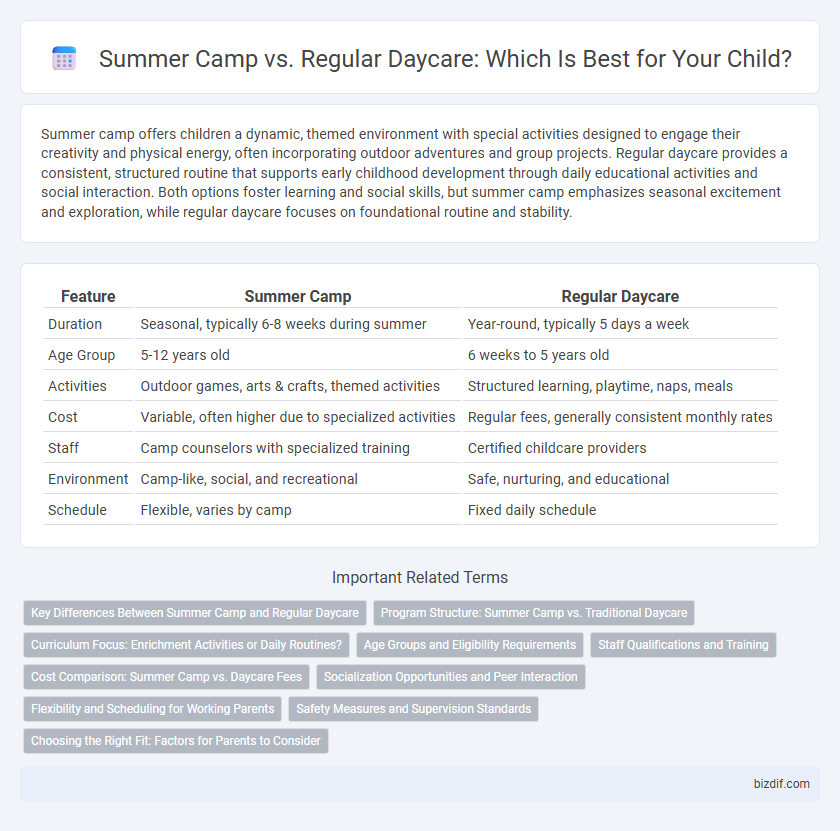Summer camp offers children a dynamic, themed environment with special activities designed to engage their creativity and physical energy, often incorporating outdoor adventures and group projects. Regular daycare provides a consistent, structured routine that supports early childhood development through daily educational activities and social interaction. Both options foster learning and social skills, but summer camp emphasizes seasonal excitement and exploration, while regular daycare focuses on foundational routine and stability.
Table of Comparison
| Feature | Summer Camp | Regular Daycare |
|---|---|---|
| Duration | Seasonal, typically 6-8 weeks during summer | Year-round, typically 5 days a week |
| Age Group | 5-12 years old | 6 weeks to 5 years old |
| Activities | Outdoor games, arts & crafts, themed activities | Structured learning, playtime, naps, meals |
| Cost | Variable, often higher due to specialized activities | Regular fees, generally consistent monthly rates |
| Staff | Camp counselors with specialized training | Certified childcare providers |
| Environment | Camp-like, social, and recreational | Safe, nurturing, and educational |
| Schedule | Flexible, varies by camp | Fixed daily schedule |
Key Differences Between Summer Camp and Regular Daycare
Summer camp programs emphasize seasonal, enriching activities such as outdoor adventures, arts and crafts, and themed events tailored to engage children during school breaks, whereas regular daycare provides consistent, daily care focused on routine development, early education, and socialization. Staff-to-child ratios in summer camps often vary to accommodate larger group activities, while regular daycare maintains stricter ratios to support individualized attention and structured learning. Operating hours for summer camps are typically shorter or more flexible compared to the extended, full-day hours standard in regular daycare settings.
Program Structure: Summer Camp vs. Traditional Daycare
Summer camp programs emphasize themed activities, outdoor exploration, and varied daily schedules designed to promote creativity and social interaction during extended hours. Traditional daycare follows a consistent routine centered on early childhood development milestones, structured play, and basic academic readiness within a familiar environment. The program structure of summer camp fosters dynamic learning experiences, while traditional daycare provides stability and foundational skills.
Curriculum Focus: Enrichment Activities or Daily Routines?
Summer camps offer a curriculum focused on enrichment activities such as arts, sports, and nature exploration, designed to stimulate creativity and physical development during the break from school. Regular daycare centers prioritize structured daily routines that emphasize foundational skills, socialization, and consistent care to support early childhood development. Choosing between the two depends on whether parents prefer a dynamic, activity-rich environment or a stable, routine-based setting for their child.
Age Groups and Eligibility Requirements
Summer camp programs typically cater to children aged 5 to 12, focusing on seasonal activities, whereas regular daycare serves a broader age range from infants as young as 6 weeks to preschoolers up to 5 years old. Eligibility for summer camps often requires children to be enrolled in elementary school or meet minimum age thresholds, while daycare settings prioritize continuous care regardless of school enrollment. Both options have specific staffing ratios and licensing requirements based on age groups to ensure safety and quality care.
Staff Qualifications and Training
Summer camp staff often possess specialized certifications in outdoor education, first aid, and activity coordination, tailored to seasonal programs. Regular daycare employees typically have formal early childhood education credentials and ongoing training in developmental milestones and safety protocols. Both environments prioritize staff qualifications to ensure child safety and support holistic development.
Cost Comparison: Summer Camp vs. Daycare Fees
Summer camp fees typically range from $200 to $600 per week, often higher than regular daycare costs, which average $150 to $400 per week depending on location and services. Summer camps may include specialized activities, meals, and field trips that increase overall expenses compared to standard daycare programs. Families should weigh these costs against the value of enriched experiences and extended hours offered by summer camps compared to routine daycare.
Socialization Opportunities and Peer Interaction
Summer camps offer enhanced socialization opportunities by providing diverse group activities that encourage teamwork and friendship-building in a dynamic setting. Regular daycare focuses on consistent peer interaction within a stable group, promoting routine social skills development and close-knit relationships. Both environments support social growth, but summer camps often stimulate broader social networks and adaptability among children.
Flexibility and Scheduling for Working Parents
Summer camp programs offer extended hours and flexible scheduling options tailored to the dynamic needs of working parents during school breaks. Unlike regular daycare, which follows a consistent daily routine, summer camps provide varied session lengths and drop-in availability, accommodating fluctuating work commitments. This flexibility helps parents maintain work-life balance while ensuring continuous care and engaging activities for their children.
Safety Measures and Supervision Standards
Summer camp and regular daycare both prioritize strict safety measures including secure check-in systems, childproof environments, and emergency response protocols to ensure children's well-being. Supervision standards at summer camps often involve higher staff-to-child ratios and specialized training for outdoor activities, whereas regular daycare maintains consistent supervision indoors with a focus on routine care and developmental support. Both settings adhere to licensing regulations and conduct regular staff background checks to maintain a safe and secure environment for children.
Choosing the Right Fit: Factors for Parents to Consider
Parents should evaluate factors such as program structure, age-appropriate activities, and staff qualifications when choosing between summer camp and regular daycare. Summer camps often emphasize seasonal, outdoor, and themed activities that promote social and physical development, while regular daycare provides consistent daily care and educational routines. Cost, location, and the child's personality and interests also play crucial roles in selecting the best fit.
Summer camp vs regular daycare Infographic

 bizdif.com
bizdif.com